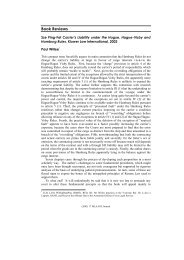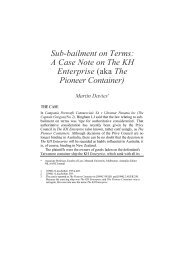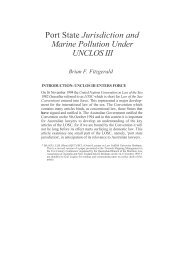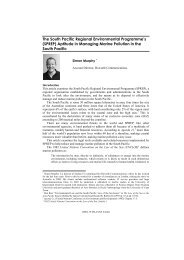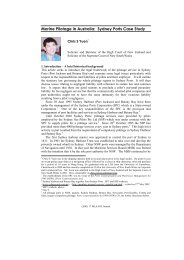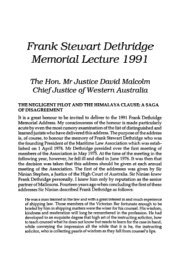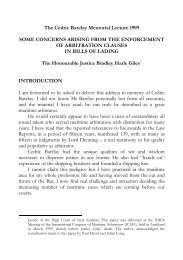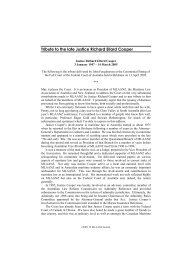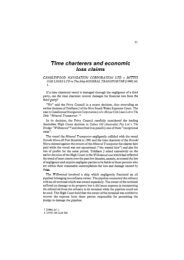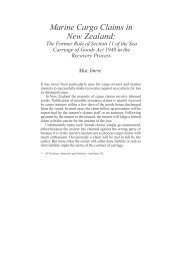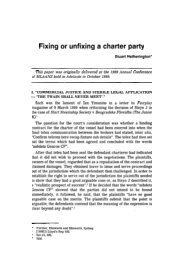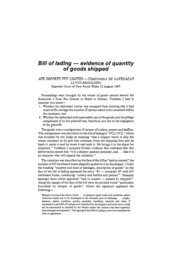Shipowners' Liabilities: Elder Dempster Revisited
Shipowners' Liabilities: Elder Dempster Revisited
Shipowners' Liabilities: Elder Dempster Revisited
Create successful ePaper yourself
Turn your PDF publications into a flip-book with our unique Google optimized e-Paper software.
<strong>Shipowners'</strong> <strong>Liabilities</strong>: <strong>Elder</strong> <strong>Dempster</strong><br />
<strong>Revisited</strong> 1<br />
HAYLIN LOW<br />
INTRODUCTION<br />
Carriage of goods by sea by its very character makes it very<br />
difficult to clearly define its parties and thus the positions of the<br />
parties. This is evidenced in the relationship between carrier and<br />
shipper. The carrier enters into the contract with the shipper 2 by<br />
undertaking to carry goods from one port to another. However, it is<br />
usually not the shipper who receives the goods at the destination, but<br />
the consignee.<br />
Even though the consignee is not a party to the original contract of<br />
carriage between the carrier and the shipper, there are instances when a<br />
contractual relationship can sometimes be established between him<br />
and the carrier. An example of this is where a contract contained in a<br />
bill of lading can be transferred to the consignee, when he receives the<br />
document 3 . An implied contract can also be established between the<br />
carrier and the consignee when the later claims the goods at the<br />
destination 4 . Contracts can also be established between the carrier and<br />
consignee through an "agency clause" 5 or "third parties" clauses 6 in<br />
certain jurisdictions.<br />
1<br />
This essay won the Morella Calder Prize for 1997 [Ed].<br />
2<br />
Some authors prefer to use the term "freighter"<br />
3<br />
The Bills of Lading Act 1855 (UK) and its Australian equivalents.<br />
4<br />
Brandt v Liverpool Brazil and River Plate Steam Navigation Co. Ltd. [1924] 1<br />
K.B. 575<br />
5<br />
New Zealand Shipping Co. Ltd v. A.M. Satterthwaite & Co. Ltd (The<br />
Eurymedon) [1975] AC 154.<br />
6<br />
Rejected within the English legal system.
32 <strong>Elder</strong> <strong>Dempster</strong> <strong>Revisited</strong><br />
Within the shipping business the way in which goods are<br />
transferred is of importance to the shipowner. Throughout the<br />
centuries the use of ships to carry goods from one destination to the<br />
other has been regarded as a joint venture between the ship and her<br />
cargo. The ship was the shipowner's contribution to that venture; e.g.<br />
the name of the ship was, and still is, clearly mentioned in the onboard<br />
bill of lading.<br />
Within the English legal system, it depended upon the documents<br />
and circumstances in each case. The question posed was whether the<br />
carrier was deemed to be the charterer or the shipowner 7 . Usually, the<br />
liable party would be a contracting party otherwise it would have been<br />
against the doctrine of privity of contract.<br />
However in England, as in the rest of the world, the master of the<br />
ship personally signed the bill of lading when the goods were delivered<br />
on board by the shipper. Often this action helped determine the carrier,<br />
since the master was regarded as the agent of the owners 8 . This<br />
constituted prima facie evidence that the master signed the bill of<br />
lading on behalf of his principal, the shipowner, and therefore the<br />
contract of carriage of goods by sea was made with the owner of the<br />
ship 9 that is to say, the owner has the prima facie responsibility for<br />
goods on board his ship 10 .<br />
7<br />
Samuel v West Hartlepool Steam Navigation (1906) 11 Com. Cas. 115 at 125.<br />
Steamship Calcutta Co. Ltd v Andrew Weir and Co. (1925) 31 Com. Cas. I l l<br />
at 111-112<br />
8<br />
Samuel v West Hartlepool Steam Navigation (1906) 11 Com. Cas. 115 at 125.<br />
Steamship Calcutta Co. Ltd v Andrew Weir and Co. (1925) 31 Com. Cas. 111<br />
at 111-112 see also some cases such as Grant v Norway (1851) 10 C.B. 665;<br />
138 E.R. 263 and Stumore v Green (1868) L.R. 2 Q.B. 86 at 98.<br />
9<br />
Schuster v McKeller (1857) 7 E. & B. 704 at 723 and Sandemann v Scurr<br />
(1866) L.R. 2 Q.B. 86 at 98.<br />
10<br />
The St. Cloud (1863) B. & L. 4 at p 15. This presumption of the shipowner as a<br />
carrier fitted very well into the existing circumstances until the liner traffic<br />
commenced during the middle of the nineteenth century.
(1998) 13 MLAANZ Journal - Part 1 33<br />
The so-called "general ships" did not have any planned schedules 11<br />
and thus much depended upon market conditions which made the<br />
ships' routes irregular. The master role was that of the owner's agent<br />
in foreign ports 12 and to find shipments in order to fill the ship's holds.<br />
He was usually also responsible for signing the bill of lading and gave<br />
it to the shipper after the goods had been loaded on board the ship. As<br />
a result the shipper became closely linked with the ship and her master.<br />
This presumption has changed with the modern situation of liner<br />
companies. The routes are advertised or announced in advance. The<br />
carrying vessel usually has set routes. However that is not the main<br />
factor. The emphasis lies on the promise to carry particular goods<br />
between particular ports as advertised by the liner company. Shippers<br />
enter into the contract with the liner company or its agent or brokers 13 ,<br />
as is confirmed by using a form of bill of lading marked with the<br />
1 See Scrutton on Charterparties (19 th ed 1984), p 1: "When the ship is put up<br />
for a particular voyage to carry goods of any persons who may be willing to<br />
ship her for that voyage, she is said to be 'put on berth' or employed as a<br />
general ship"; but Thompson: Outline of the Law relating to Bills of Lading,<br />
(London 1925), p 3 uses the phrase general ship when the ship is not chartered<br />
and prepared to carry the goods of anyone who may offer them shipment.<br />
12 See for instance Grant v Norway (1851) 10 C.B. 665; 138 E.R. 263, The St.<br />
Cloud (1863) B. & L. 4, The Figlia Maggiore (1868) 2 A. & E. 106,<br />
Sandemann v Scurr (1866) L.R. 2 Q.B. 86, Stumore v Green (1868) L.R. 2<br />
Q.B. 86.<br />
13 "All the regular shipping lines operating from the United Kingdom appear to<br />
entrust the business of arranging the cargo to a loading broker. He advertised<br />
the date of sailing in shipping paper or elsewhere, and generally prepares and<br />
circulates to his customers a sailing card. It is his business to supervise the<br />
arrangements for loading, through the actual storage is decided by the cargo<br />
superintendent. It is the broker's business also to sign the bill of lading, and<br />
issue it to the shipper of his agent in exchange for the freight": Devlin J. (as he<br />
then was) in the case ofHeskell v Continental Express Ltd. [1950] 1 All E.R.<br />
1033 at 1037.
34 <strong>Elder</strong> <strong>Dempster</strong> <strong>Revisited</strong><br />
liner's identity regardless of whether the carrying vessel belongs to the<br />
liner or is a chartered ship. 14<br />
The goods are not necessarily delivered along the ship's side. They<br />
can be left at the liner's or broker's offices or quarters far away from<br />
the port area. The identity of the vessel is not necessarily any longer<br />
stated in the document, as for instance is the case with the received bill<br />
of lading and most of the sea way bills. The signature of the bill of<br />
lading or other documents is now hardly ever carried out by the<br />
master. Usually it is done by the shipowner's office staff or senior<br />
members of the agent's or broker's staff and it is delivered to the<br />
shipper after the ship has left the port.<br />
The liner companies as such have also undergone some<br />
developments. They used to be shipowning companies and<br />
temporarily added chartered vessels to their fleets. Now it has become<br />
more common, due to economic reasons, that they do not own the<br />
ships, but instead run a fleet of (time) chartered ships.<br />
Thus the presumption that the shipowner is the carrier no longer<br />
exists, since most of the contracts of carriage of goods by sea today are<br />
undertaken by liners 15 , even if from time to time they have to add to<br />
their normal fleets some ships under charterparties (voyage or time) in<br />
order to satisfy their business commitments.<br />
Forwarding agents, whose original tasks were agency and other<br />
companies have begun to undertake carriage of goods as principals by<br />
consolidating several cargoes belonging to different shippers into one<br />
container. They issue normal sea transport documents like a bill of<br />
lading but they also issue house bill of lading and combined transport<br />
14 See for McLaughlin: "The Evolution of the Ocean Bill of Lading" (1925) 35<br />
Yale Law Journal 548 at 563-564.<br />
5 See for instance, Ramberg: "Cancellation of Contract of Affreightment on<br />
Account of War and similar Circumstances" and "The Time-Charterer's<br />
Liability against the Bill of Lading Holders" (1966) ETL 874 at 882.
(1998) 13 MLAANZ Journal - Part 1 33<br />
The so-called "general ships" did not have any planned schedules 11<br />
and thus much depended upon market conditions which made the<br />
ships' routes irregular. The master role was that of the owner's agent<br />
in foreign ports 1 and to find shipments in order to fill the ship's holds.<br />
He was usually also responsible for signing the bill of lading and gave<br />
it to the shipper after the goods had been loaded on board the ship. As<br />
a result the shipper became closely linked with the ship and her master.<br />
This presumption has changed with the modern situation of liner<br />
companies. The routes are advertised or announced in advance. The<br />
carrying vessel usually has set routes. However that is not the main<br />
factor. The emphasis lies on the promise to carry particular goods<br />
between particular ports as advertised by the liner company. Shippers<br />
enter into the contract with the liner company or its agent or brokers 13 ,<br />
as is confirmed by using a form of bill of lading marked with the<br />
1 See Scrutton on Charterparties (19* ed 1984), p 1: "When the ship is put up<br />
for a particular voyage to carry goods of any persons who may be willing to<br />
ship her for that voyage, she is said to be 'put on berth' or employed as a<br />
general ship"; but Thompson: Outline of the Law relating to Bills of Lading,<br />
(London 1925), p 3 uses the phrase general ship when the ship is not chartered<br />
and prepared to carry the goods of anyone who may offer them shipment.<br />
12 See for instance Grant v Norway (1851) 10 C.B. 665; 138 E.R. 263, The St.<br />
Cloud (1863) B. & L. 4, The Figlia Maggiore (1868) 2 A. & E. 106,<br />
Sandemann v Scurr (1866) L.R. 2 Q.B. 86, Stumore v Green (1868) L.R. 2<br />
Q.B. 86.<br />
13 "All the regular shipping lines operating from the United Kingdom appear to<br />
entrust the business of arranging the cargo to a loading broker. He advertised<br />
the date of sailing in shipping paper or elsewhere, and generally prepares and<br />
circulates to his customers a sailing card. It is his business to supervise the<br />
arrangements for loading, through the actual storage is decided by the cargo<br />
superintendent. It is the broker's business also to sign the bill of lading, and<br />
issue it to the shipper of his agent in exchange for the freight": Devlin J. (as he<br />
then was) in the case ofHeskell v Continental Express Ltd. [1950] 1 All E.R.<br />
1033 at 1037.
34 <strong>Elder</strong> <strong>Dempster</strong> <strong>Revisited</strong><br />
liner's identity regardless of whether the carrying vessel belongs to the<br />
liner or is a chartered ship. 14<br />
The goods are not necessarily delivered along the ship's side. They<br />
can be left at the liner's or broker's offices or quarters far away from<br />
the port area. The identity of the vessel is not necessarily any longer<br />
stated in the document, as for instance is the case with the received bill<br />
of lading and most of the sea way bills. The signature of the bill of<br />
lading or other documents is now hardly ever carried out by the<br />
master. Usually it is done by the shipowner's office staff or senior<br />
members of the agent's or broker's staff and it is delivered to the<br />
shipper after the ship has left the port.<br />
The liner companies as such have also undergone some<br />
developments. They used to be shipowning companies and<br />
temporarily added chartered vessels to their fleets. Now it has become<br />
more common, due to economic reasons, that they do not own the<br />
ships, but instead run a fleet of (time) chartered ships.<br />
Thus the presumption that the shipowner is the carrier no longer<br />
exists, since most of the contracts of carriage of goods by sea today are<br />
undertaken by liners 15 , even if from time to time they have to add to<br />
their normal fleets some ships under charterparties (voyage or time) in<br />
order to satisfy their business commitments.<br />
Forwarding agents, whose original tasks were agency and other<br />
companies have begun to undertake carriage of goods as principals by<br />
consolidating several cargoes belonging to different shippers into one<br />
container. They issue normal sea transport documents like a bill of<br />
lading but they also issue house bill of lading and combined transport<br />
14 See for McLaughlin: "The Evolution of the Ocean BUI of Lading" (1925) 35<br />
Yale Law Journal 548 at 563-564.<br />
5 See for instance, Ramberg: "Cancellation of Contract of Affreightment on<br />
Account of War and similar Circumstances" and "The Time-Charterer's<br />
Liability against the Bill of Lading Holders" (1966) ETL 874 at 882.
(1998) 13 MLAANZ Journal - Part 1 35<br />
documents 16 . These principals have no connections with the carrying<br />
vessel in that sense, being neither her owner nor her charterer.<br />
However, they enter into a contract of carriage with the charterer or<br />
shipowner, who become the carriers. On the other hand there is no<br />
contractual relationship between the previous named shippers (the<br />
original ones) and the charterer or the shipowner.<br />
In spite of these changes, there is a tendency to regard or define the<br />
shipowner as a carrier and a reluctance to deem someone else to be a<br />
carrier. It is sometimes stated in the printed forms of bills of lading that<br />
it is signed on behalf of the master 17 . However, there are instances<br />
where the shipowner is not defined as the carrier and it is in these cases<br />
where the position of the shipowner is even more difficult to<br />
determine. In such a situation where the shipowner is no longer<br />
defined as the carrier, what responsibilities and obligations rest with<br />
the shipowner having regard to bills of lading and goods at sea<br />
contracts? This paper shall attempt to examine the position of the<br />
shipowner when not defined as the carrier with reference to case law<br />
and in particular <strong>Elder</strong> <strong>Dempster</strong>,<br />
A DUTY OF CARE: ELDER DEMPSTER ANALYSED<br />
In <strong>Elder</strong>, <strong>Dempster</strong> & Co. and Others v Zochonis & Co. 18 a wellknown<br />
shipping company ran a line of cargo steamers from England to<br />
West Africa. The shipping company, <strong>Elder</strong>, <strong>Dempster</strong> Co. 19 required<br />
an additional ship for their regular business and they chartered a ship<br />
6 See generally about this development for instance by Holloway: "Troubled<br />
Waters: The Liability of a Freight Forwarders as a Principal under Anglo-<br />
Canadian Law" (1986) 17 JMLC at 243-260 and Tetley: "Responsibility of<br />
Freight Forwarders" (1987) ETL 79 at pp. 79-80.<br />
7 See for instance forms of a bill of lading from Uni-Fedder and Container<br />
Service AS: "In Witness whereof the Master of the said vessel has signed the<br />
number of the original Bills of Lading stated below"; in the forms from for<br />
8<br />
instance DFDA, Central American Service<br />
[1924] A.C. 522 (hereinafter referred to as the <strong>Elder</strong>, <strong>Dempster</strong> case)<br />
19 Hereinafter referred to as the charterers.
36 <strong>Elder</strong> <strong>Dempster</strong> <strong>Revisited</strong><br />
from another shipping company 20 on a time-charter basis. The <strong>Elder</strong>,<br />
<strong>Dempster</strong> Co. were also managers for the African Steamship Co. and<br />
the British and African Steam Navigation Co. The bills of lading were<br />
issued in the name of all these companies and signed by the master.<br />
The form of the bills of lading it is assumed were in the usual form<br />
issued. 21 All these companies were sued in addition to the shipowners<br />
by the shipper who was also the holder of the bills of lading for alleged<br />
damage to the goods due to bad stowage.<br />
The courts also considered the legal position of the defendants in<br />
relation to the plaintiff, particularly if the shipowner was not deemed<br />
to be the carrier, could he nonetheless rely on the terms of the bill of<br />
lading.<br />
Rowlatt, J. at first instance, had no doubts who the carrier was<br />
under these circumstances:<br />
In the first place, it seems to be that there is a contract with the African<br />
Steamship Co. on this bill of lading. This is a case where a well-known<br />
line of ships found it necessary to supplement its fleet by getting in<br />
another upon a time charterer; and people in the commercial world<br />
who use the line know nothing at all about that. They think they are<br />
shipping by this line; and unless it is clear to the contrary the contract<br />
22<br />
should be regarded as being made with the line.<br />
This part of Rowlatt J's judgment was not amended by the<br />
subsequent decisions of the Court of Appeal 23 and House of Lords. 24<br />
In the Court of Appeal both Bankes L.J. 25 and Scrutton L.J. 26<br />
expressed that the charterers were parties to the contract contained in<br />
20 Hereinafter referred to as the shipowners.<br />
21 Lord Sumner in [1924] A.C. 522 at 564 said the bills of lading had been on a<br />
"well-known" form. !2<br />
(1922) LI. L. Rep 69 at 71. ' 3<br />
(1923] 1 K.B.420. 4 [1924]<br />
A.C. 522.<br />
25<br />
26<br />
[1923] 1 K.B.420 at 436.<br />
Ibid at 443.
(1998) 13 MLAANZ Journal - Part 1 37<br />
fyj<br />
the bill of lading. In the House of Lords none of their Lordships<br />
commented directly upon this issue. Nonetheless, it is clear from their<br />
Lordships' judgments, that all of them presumed the charterers were<br />
the carrier. The shipowner was not regarded as a party to the bill of<br />
lading's contract and the Court decided, if the owner was liable in tort<br />
or was entitled to rely on the terms of the bill of lading. The only<br />
possible parties to the contract of carriage were either the charterers or<br />
the shipowner. Since it was not the shipowner, it must therefore have<br />
been the charterers. Lord Sumner 29 went further. He pointed out that<br />
whilst considering the shipowner's position against the shipper, the<br />
ship was temporarily placed in a well-known line, trading under a<br />
well-known form of a bill of lading. 30 Apparently his Lordship was<br />
aware of these circumstances, under which he regarded the charterers,<br />
but not the shipowner, as the carrier. But the shipowners were held<br />
liable accordance with the terms of the bill of lading, not on the basis<br />
of law of tort.<br />
In the Court of Appeal Bankes L.J. said on this issue:<br />
With regard to the owners I cannot see how they can be in a better<br />
position than the charters and grantors of the bills of lading.<br />
Scrutton L.J. stated the following point:<br />
My view is that the shipowner is not in possession as a bailee, but as<br />
the agent of a person, the charterer, with whom the owner of the goods<br />
has a contract defining his liability, and that the owner as servant as of<br />
the charterer can claim the same protection as the charterer. Were it<br />
otherwise there would be an easy way round the bill of lading in the<br />
Nothing similar can be read in this respect in the judgment of the remaining<br />
judge, Eve J. at 446-447.. 28 Viscount Cave [1924] A.C. at 533-534, Viscount<br />
Finley ibid 547-548, Lord<br />
Sumner ibid. 564-565; Lord Dunedin agreed with Lord Sumner ibid 548 and<br />
Lord Carson agreed with both Lord Cave and Lord Sumner.<br />
9 With whom Lord Dunedin and Lord Carson agreed.<br />
30<br />
31<br />
[1924]A.C. 522 at 564.<br />
[1923] 1 K B. 420 at 436.
38 <strong>Elder</strong> <strong>Dempster</strong> <strong>Revisited</strong><br />
case of every chartered ship; the owner of the goods would simply sue<br />
the owner of the ship and ignore the bill of lading exceptions, though<br />
he had contracted with the charterer for carriage on those terms and the<br />
owner had only received the goods as agent for the charterer. In Hayn<br />
v. Culliford, referred to by the Court, the charterer was not protected<br />
by his bill of lading, and it was useless for the owner to claim the<br />
benefit of the bill of lading, or say he held its terms. If he held on the<br />
terms of the bill of lading its terms did not protect him.<br />
His Lordship was proposing the doctrine of vicarious immunity,<br />
that is servants, or agents, could claim the same contractual immunities<br />
as their master in spite of the fact that they were not contracting parties<br />
to the charterparty. This rule would, of course, be in an absolute<br />
contrast to the doctrine of privity of contract and its application would<br />
not be confined just to contracts of carriage of goods by sea, but would<br />
apply to all contracts. 33<br />
The House of Lords made the unanimous decision that the owner<br />
should be entitled to rely on the same contractual immunities as the<br />
carrier, but their Lordships did not agree among themselves.<br />
Viscount Cave gave the following opinion:<br />
It was stipulated in the bills of lading that "the shipowners" should not<br />
be liable for any damage arising from other goods by stowage or<br />
contact with the goods shipped under the bills of lading; and it appears<br />
to me that this was intended to be a stipulation on behalf of all the<br />
persons interested in the ship, that is to say, charterers and owners<br />
alike. It may be that the owners were not directly parties to the<br />
contract; but they took possession of the goods on behalf of the<br />
charterers, and so can claim the same protection as their principals.<br />
His Lordship noted that the bills of lading were not issued only on<br />
behalf of the charterers but also on behalf of the shipowners, the so-<br />
2 Ibid, at 441-442.<br />
33 See later Mersey Transport Co. Ltd. v Rea Ltd. (1925) 21 LI. L. Rep. 375 and<br />
the Australian case of the so-called stevedores' problems: Gilbert Stokes Kerr<br />
Pty. Ltd. v Dalgety & Co Ltd (1948) 48 SR (NSW) 435.<br />
34 [1924] A.C. 522 at 534.
(1998) 13 MLAANZ Journal - Part 1 39<br />
called "express contract theory" 35 . Alternatively, Viscount Cave was<br />
prepared to base his decision on the theory of vicarious immunity from<br />
liability in torts in the same way as Scrutton L. J.<br />
Viscount Finley gave the following statement on this issue:<br />
It is said that... this wrongful act..., committed by their servants, the<br />
shipowners are liable, apart from contract altogether, so that the<br />
plaintiffs, in claiming from the shipowners, would not be hampered by<br />
the conditions of the bill of lading. The contention seems to me to<br />
overlook the fact that the act complained of was done in the course of<br />
the stowage under the bill of lading, and that the bill of lading provided<br />
that the owners are not to be liable for bad stowage. If the act<br />
complained of had been an independent tort unconnected with the<br />
performance of the contract evidenced by the bill of lading, the case<br />
would have been different. But, when the act is done in the course of<br />
rendering the very service provided for in the bill of lading, the<br />
limitation of liability therein contained must attach, whatever the form<br />
of the action and whether the owner or charterer be sued. It would be<br />
absurd that the owner of the goods could get rid of the protective<br />
clauses of the bill of lading, in respect of all stowage, by suing the<br />
owner of the ship in tort. The Court of Appeal were, in my opinion,<br />
right in rejecting this contention, which would lead to results so<br />
extraordinary as these referred to by Scrutton L.J. in his judgment.<br />
Viscount Finley seems to have supposed, that when the shippers<br />
delivered possession of the goods to the shipowners an implied<br />
contract, or bailment was thereby made between them and the<br />
shipowners. The latter should carry the goods on the terms of the bill<br />
of lading. This is the "implied contract theory" 37 or the bailment<br />
theory, which was also favoured by Lord Summer. 38<br />
Lord Sumner's first and preferred reason was the implied contract<br />
of bailment upon the terms of the bill of lading. But alternatively, Lord<br />
35<br />
Diplock J. (as he then was) in Midland Silicones Ltd v Scruttons [1959] 2 Q.B.<br />
170 at 186.<br />
36<br />
[1924] A.C. 522 at 547-548.<br />
37<br />
[1959] 2 Q.B. 170 at 187, per Diplock J.<br />
38 Ibid.
40 <strong>Elder</strong> <strong>Dempster</strong> <strong>Revisited</strong><br />
Sumner suggested, that the master, whose negligence was the cause of<br />
the damage, was not acting as an agent for the shipowners, but was<br />
acting as the charterers' agent and the shipowners would therefore not<br />
be vicariously liable for his negligence.<br />
Lord Dunedin agreed with Lord Sumner, 39 but Lord Carson agreed<br />
with both Lord Sumner and Viscount Cave, 40 thus endorsing four<br />
separate reasons for the decision. These different opinions make it very<br />
difficult to establish the actual ratio decidendi in relation to the<br />
shipowner's position. 41<br />
Four judges, Lord Dunedin, Lord Sumner, Lord Carson in addition<br />
to Viscount Finley approved the implied contract or bailment theory.<br />
Three judges, Lord Sumner, Lord Dunedin and Lord Carson, as<br />
second choice, preferred the theory that the master was not the servant<br />
or agent of the shipowner but was acting as the agent of the charterer.<br />
Two judges Lord Carson and Viscount Cave, or possibly three if Lord<br />
Finley can be included, adopted the express contract theory, but only<br />
two, Lord Carson and Viscount Cave, adopted the vicarious immunity<br />
theory 42 .<br />
This particular aspect of the case has been described as<br />
compressed 43 or very obscure 44 . Donaldson J. (as he then was)<br />
described the case as "something of a judicial nightmare." 45 Due to<br />
this complexity of the case, it has for a long time been a subject for<br />
dispute, both among judges and writers as to the grounds on which<br />
their Lordships actually based their opinions, or what was the actual<br />
ratio decidendi of the case.<br />
39<br />
[ 1924] A.C. 522 at 522-523.<br />
40<br />
Ibid, at 548.<br />
41<br />
Ibid, at 565.<br />
42<br />
See for instance Lord Keith of Avonholm in Midland Silicones Ltd v Scruttons<br />
[1962] A.C. 446 at 481.<br />
43<br />
[1959] 2 Q.B. 170 at 187, per Diplock J.<br />
44<br />
Adler v Dickson [1954] 1 Q.B 158 at 182, per Lord Denning.<br />
45<br />
Johnson Matthey & Co. v Constantine Terminals Ltd. [1976] 2 Lloyd's Rep.<br />
215 8*219.
(1998)13 MLAANZ Journal - Part 1 41<br />
VICARIOUS IMMUNITY, BAILMENT AND TORTS<br />
<strong>Elder</strong> <strong>Dempster</strong> has been revisited in a number of allied cases.<br />
In Vita Food Products Inc. v Unus Shipping Co 46 Lord Wright<br />
referred in passing to Lord Sumner's bailment theory, 7 which could<br />
indicate, that the Privy Council regarded that approach as the proper<br />
ratio decidendi of the <strong>Elder</strong>, <strong>Dempster</strong> case 4 Among other judges the<br />
<strong>Elder</strong>, <strong>Dempster</strong> case was found to be an authority for a general rule<br />
of vicarious immunity 49 , or alternatively was authority for the<br />
proposition of a bailment upon terms, an implied contract of bailment<br />
between the shipper and shipowner on the terms of the bill of lading. 50<br />
Lord Denning found the <strong>Elder</strong>, <strong>Dempster</strong> case authority both for a<br />
third parties contract (jus quaesitum tertidf 1 and as an implied<br />
contract of bailment 52<br />
46<br />
[1939] A.C. 277.<br />
47<br />
Ibid, at 301.<br />
8<br />
Fullagar J. in Wilson v Darling Island Stevedoring Co. (1956) 95 C.L.R. 43.<br />
49<br />
Scrutton L.J. in Mersey Shipping Transport v Rea Ltd. (1925) 21 LI. L. R. 375<br />
and Waters Trading Co. Ltd. vDalgery & Co. Ltd. [1951] 2 Lloyd's Rep. 385.<br />
50<br />
Langton J. in The Kite [1933] P. 155 at 181, and Owen J. in the Australian<br />
cases of Gilbert Stokes & Kerr Pty. Ltd. v Dalgety & Co. Ltd. & Co Ltd<br />
(1948) 48 SR (NSW) 435. However, Owen J.also relied on bailment as<br />
alternative: see ibid at 342-343 and also in Walters Trading Co. Ltd. v Dalgety<br />
& Co. Ltd. [1951] 2 Lloyd's Rep 385 at 388-389. In the latter case Street C.J.<br />
at 395 declared immaterial whether the <strong>Elder</strong>, <strong>Dempster</strong> case was based on<br />
bailment upon terms or vicarious liability see 387, but the third judge, Herron<br />
J. at 395 upheld the vicarious immunity theory. Devlin J. (as he then was) in<br />
Pyrene Co. Ltd. v Scindia Navigation Co. Ltd. [1954] 2 Q.B. 402 upheld both<br />
the vicarious immunity theory at 421-422 and the bailment theory at 426-427<br />
as alternative ratio decidendi of the <strong>Elder</strong>, <strong>Dempster</strong> case.<br />
51<br />
SeeAdler vDickson [1955] 1 Q.B. 158 at 182-183 (see comments by Montrose:<br />
"Jus Quaesitum Tertio" (1957) 20 MLR 658 at 661 ff.) and Midland Silicones<br />
vScruttons [1962] A.C. 422 at 488.<br />
52<br />
Morris v C. W. Martin & Sons Ltd. (1965)2 Lloyd's Rep. 63 at 72.
42 <strong>Elder</strong> <strong>Dempster</strong> <strong>Revisited</strong><br />
Other judges had different views, hi Mersey Shipping & Transport<br />
Co. Ltd. v Rea Ltd. 53 Lord Justice Bankes said that what the House of<br />
Lords had decided in the <strong>Elder</strong>, <strong>Dempster</strong> case was:<br />
that under the circumstances of the vessel being chartered to form one<br />
of the owner's regular line, the proper inference to draw was that the<br />
goods were shipped under conditions which would cover both<br />
charterer and shipowner.<br />
In Adler v Dickson 55 Lord Justice Jenkins adopted Lord Justice<br />
Bankes' opinion about the <strong>Elder</strong>, <strong>Dempster</strong> case. 56 Lord Justice<br />
Morris said on the other hand that in the <strong>Elder</strong>, <strong>Dempster</strong> case the<br />
circumstances existing at the time the goods were received on board<br />
was occasion for an implied contract between those delivered, the<br />
shippers and those who received, the master on behalf of the<br />
shipowners. 57<br />
Among commentators the <strong>Elder</strong>, <strong>Dempster</strong> case was regarded as an<br />
authority for vicarious immunity 58 or alternatively for the proposition<br />
of an implied contract or bailment and the express contract theory. 59<br />
The theory of vicarious immunity would not only affect the<br />
shipowner, but also anybody rendering services in conjunction with a<br />
i3<br />
(1925) 21 LL. L. Rep. 375.<br />
4<br />
Ibid, at 377.<br />
5<br />
[1954] 2 Lloyd's Rep. 267.<br />
56<br />
Ibid, at 280.<br />
7<br />
Ibid, at 282.<br />
58<br />
Dworkin: "Stare Decisis in the House of Lords" (1962) 25 MLR 163, Reiter<br />
and Swan: Studies in Contract Law p. 300; Restatement of the Law of<br />
Agency, para. 374 p. 759.<br />
' 9 Mankabady: "Rights and Immunities of the Carrier's Servants and Agents"<br />
(1973-1974) 5 JMLC 111 at 114-115 and "Comment on the Hamburg Rules"<br />
in The Hamburg Rules on Carriage of Goods by Sea, p. 66, Furmston:<br />
"Return to Dunlop v Selfridge" (1960) 23 MLR 376 at 391-392, Guest: "Bills<br />
of Lading and a Jus Quaesitum Tertio" (1959) 75 LQR 312 at 313ff, Treitel:<br />
"Exemption Clauses and ThirdParties"(l955) 18 MLR 172 at 173-174. The<br />
last three mentioned comments were written before the House of Lords'<br />
decision in Midland Silicones Ltd v Scruttons [1962] A.C. 446.
(1998) 13 MLAANZ Journal - Part 1 43<br />
contract of carriage and generally whenever an agent or servant would<br />
be working on behalf of his master. In fact this theory and the theory<br />
of third parties contract were breaches in the doctrine of privity of<br />
contract. The other theories explaining the reasons for the <strong>Elder</strong>,<br />
<strong>Dempster</strong> case however did not infringe any common law principles.<br />
It is somewhat surprising that a quarter of a century elapsed before<br />
it was generally recognised that the <strong>Elder</strong>, <strong>Dempster</strong> case might have<br />
made a breach in the doctrine of privity of contract. 60 It happened<br />
after decisions in two Australian cases, Gilbert Stokes & Kerr Pty Ltd<br />
v Dalgety & Co. Ltd. 61 and Waters Trading Co. Ltd. v Dalgety & Co.<br />
Ltd. 62 In these cases the <strong>Elder</strong>, <strong>Dempster</strong> case was held to be an<br />
authority for vicarious immunity and stevedoring companies<br />
succeeded in claiming the right to rely on stipulations in bills of lading<br />
against their holders, in spite of the fact that they were not parties to<br />
the contracts of carriage.<br />
However, if these Australian cases endorsed the theory of vicarious<br />
immunity based on the <strong>Elder</strong>, <strong>Dempster</strong> case such attempt received a<br />
set-back after the decision of the High Court of Australia in the case of<br />
Wilson v Darling Island Stevedoring and Lighterage Co. Ltd. 64<br />
when these cases were overruled. It was rejected by the majority 65 that<br />
the <strong>Elder</strong>, <strong>Dempster</strong> case was an authority for doctrine of vicarious<br />
immunity and stevedores were held liable in tort against the bill of<br />
lading holder, since they were not parties to the contract of carriage<br />
evidenced by the bill of lading.<br />
0 Montrose: "Jus Quaesitum Tertio" op. cit. p. 659. 61<br />
(1948) 48 SR (NSW) 435. ' 2 [1951] 2 Lloyd's Rep.<br />
387.<br />
63 See for instance Lord Reid in the Midland Silicones [1962] A.C. 446 at 479: "I<br />
must say I have considerable doubt whether Scrutton L.J. can really have<br />
64<br />
intended his rule to be so far-reaching."<br />
(1956) 95 C.L.R. 43.<br />
65 Dixon CJ. Fullagar and Kitto JJ., but Williams and Taylor JJ dissenting.
44 <strong>Elder</strong> <strong>Dempster</strong> <strong>Revisited</strong><br />
Fullagar J 66 agreed with Lord Justice Bankes in Mersey Shipping &<br />
Transport Co. Ltd. v Rea Ltd. and Lord Morris in Adler v Dickson<br />
about the <strong>Elder</strong>, <strong>Dempster</strong> case and confined its authority to its facts.<br />
His conclusion about the authority of the <strong>Elder</strong>, <strong>Dempster</strong> case was:<br />
that in such a case, the master having signed the bill of lading, the<br />
proper inference is that the shipowner, when he received the goods into<br />
his possession, receives them on the terms of the bill of lading. The<br />
same inference might perhaps be drawn in some cases even if the<br />
charterer himself signed the bill of lading, but it is unnecessary to<br />
consider any such question.<br />
y-O<br />
After the Midland Silicones v Scruttons case all speculation<br />
about vicarious immunity and third parties' right under the contract<br />
were finally put to rest. The House of Lords in the Midland Silicones<br />
case (Lord Denning dissenting) agreed that the <strong>Elder</strong>, <strong>Dempster</strong> case<br />
had not introduced any new legal principles into the English legal<br />
system. However, it was not overruled, and as such since it was<br />
distinguished on grounds of different circumstances 69 and that no<br />
bailment existed in the Midland Silicones case. 70<br />
Nonetheless the <strong>Elder</strong>, <strong>Dempster</strong> case was considered by their<br />
71 T?<br />
Lordships. Viscount Simonds and Lord Keith of Avonholm<br />
expressed their acceptance of Fullagar J.'s judgment in Wilson v<br />
Darling Island Stevedoring Co. about the <strong>Elder</strong>, <strong>Dempster</strong> case, Lord<br />
Morris referred to Lord Sumner's judgment in the <strong>Elder</strong>, <strong>Dempster</strong><br />
' With whom Dixon CJ. agreed. Kitto J. agreed in substance but his approach<br />
was different.<br />
The U.S. Supreme Court relied on this case in Herd & Co. v Krawill<br />
Machinery Corp. [1959] 1 Lloyd's Rep. 305. 18 [1962]A.C.466.<br />
9 In the Midland Silicones case, a stevedoring company was claiming the limits<br />
of liability stated in the bill of lading towards its holder in litigation in tort, but the<br />
stevedores were not parties to the contract evidenced by the bill of lading. 70<br />
[1962]A.C.422at470. 1 Ibid, at 469-470. 72 Ibid at 481.
(1998) 13 MLAANZ Journal - Part 1 45<br />
case but did not state his view on the true ratio decidendi of the case.<br />
Lord Denning probably found the <strong>Elder</strong>, <strong>Dempster</strong> case as an<br />
authority for a doctrine of a third parties' contract, 74 but Lord Reid did<br />
not however comment on the <strong>Elder</strong>, <strong>Dempster</strong> case.<br />
In a recent decision by the Court of Appeal, The Kapetan Markos<br />
(No.2), 15 Lord Justice Mustill said perhaps the correct rationalisation<br />
of the <strong>Elder</strong>, <strong>Dempster</strong> case was the one adopted by Fullagar J. in the<br />
Wilson v Darling Island Stevedoring Co. case. 76<br />
Logically, after the House of Lords' decision in the Midland<br />
Silicones case, scholars have omitted vicarious immunity as an<br />
alternative explanation of the <strong>Elder</strong>, <strong>Dempster</strong> case in recent<br />
publications and just confined the alternatives either to the bailment<br />
(implied contract) theory or the theory of the express contract. 77<br />
The writer proposes that it is inevitable to conclude that the implied<br />
or bailment theory is the proper decidendi of the <strong>Elder</strong>, <strong>Dempster</strong><br />
case. After all it was approved by four of their Lordships and it<br />
involves no novel principles of law. It has in principle been accepted in<br />
subsequent cases such as Adler v Dickson, Wilson v Darling Island<br />
Stevedoring Co., Midland Silicones v Scruttons, and perhaps also The<br />
Kapetan Markos.<br />
The concept behind this theory is clear. The master received the<br />
goods on board the ship for ocean carriage and in exchange for it he<br />
gave the shipper a receipt, a signed bill of lading. The shipper accepted<br />
3<br />
Ibid, at 494: "Whether or not the view of the facts in the <strong>Elder</strong>, <strong>Dempster</strong> case,<br />
which are expressed by Lord Sumner, in his judgment, which commended the<br />
agreement of Lord Dunedin and Lord Carson, can be regarded as a satisfactory<br />
explanation of the case, a similar view was also expressed by Diplock J. (as he<br />
then was) at the first instance."<br />
4<br />
Ibid, at 482 ff.<br />
5<br />
[1987] 2 Lloyd's Rep. 321.<br />
76<br />
Ibid, at 331.<br />
77<br />
Chitty on Contracts (27th ed. London 1992), para. 905, Treitel, The Law of<br />
Contract pp. 467-468, Rose: "Return to <strong>Elder</strong>, <strong>Dempster</strong>" (1982) 4 Anglo<br />
American Law Review 7 at 8.<br />
T\
46 <strong>Elder</strong> <strong>Dempster</strong> <strong>Revisited</strong><br />
it without any reservation and therefore accepted its terms. An implied<br />
contractual relationship between the shipowner and the shipper had<br />
been established in the nature of bailment upon the terms of the bill of<br />
7fi<br />
lading. This theory is in one way in line with cases concerning the<br />
general authority of the master to bind the shipowner, but it is also<br />
parallel to the case of Brandt v Liverpool when an implied contract<br />
was established upon the terms of the bill of lading between its holder<br />
and the carrier when the former delivered the bill of lading to the latter<br />
and demanded the goods upon its terms and the carrier accepted it by<br />
delivering the goods. In the <strong>Elder</strong>, <strong>Dempster</strong> case the situation is the<br />
reverse of that in the Brandt v Liverpool case. Logically the same rule<br />
should apply, whether the bill of lading is accepted as a receipt in<br />
exchange for the goods or when the goods are handed over in<br />
exchange for a receipt.<br />
In the <strong>Elder</strong>, <strong>Dempster</strong> case the master himself signed the bill of<br />
lading. The question arises, if the authority of the case is confined to<br />
this fact or if it would apply as well to cases when the charterer signs<br />
the bill of lading, whether it is signed on behalf of the master,<br />
shipowner or no reference at all is made to the ship.<br />
The former opinion was adopted by Lord Keith in the Midland<br />
Silicones case which prevents an establishment of a contract between<br />
the case 80 and accepted as correct by Carver 81 and Wilford. 82 Fullagar J.<br />
in Wilson v Darling Island Stevedoring and Lighterage said the<br />
same rule might apply but it was unnecessary for him to decide it.<br />
Lord Bankes in Mersey Shipping & Transport Co. Ltd. v Rea Ltd.<br />
!<br />
Not shipowner and shipper, even if the former is under the same contractual<br />
duty towards the carrier (the charterer of the ship) to carry the same goods to<br />
the same destination, see Scotson v Pegg (1861) 6 H. & N. 295, confirmed by<br />
the Privy Council in New Zealand Shipping Co. Ltd v. A.M. Satterthwaite &<br />
Co. Ltd (The Eurymedon) [1975] AC 154.<br />
9<br />
[1924] 1K.B. 575.<br />
0<br />
[1962]A.C.422at481.<br />
11<br />
Carver, Carriage of Goods (1981), s. 717.<br />
82<br />
Wilford et al: Time Charters (2nd ed., London 1978), p. 215.
(1998) 13 MLAANZ Journal - Part 1 47<br />
might have been supporting the latter approach, since he regarded the<br />
<strong>Elder</strong>, <strong>Dempster</strong> case as an authority for, when a vessel is chartered to<br />
be operated in a regular liner service, both charterer and shipowner<br />
should be covered by the same conditions and his Lordship did not<br />
refer to the presence of the signature. In order to reach a conclusion, it<br />
is necessary to investigate more fully their Lordships' judgments in the<br />
<strong>Elder</strong>, <strong>Dempster</strong> case, particularly those from Lord Sumner and<br />
Viscount Finley.<br />
They both shared the view, that it was unfair and unjust if the bill of<br />
lading holder could avoid the contractual terms with the carrier as<br />
stated in the bill of lading by suing the shipowner in tort. This idea was<br />
described as "absurd". 83<br />
Lord Sumner refused to accept Hayn v Culliford as a general<br />
authority for shipowners' responsibility in tort. He explained the<br />
difference between the cases, that in the <strong>Elder</strong>, <strong>Dempster</strong> case, the<br />
ship Grelwyn was temporarily placed in a well-known line, trading<br />
under a well-known form of bill of lading. Later he continued by<br />
expressing the theory of bailment:<br />
It may be, that in the circumstances of this case the obligations to be<br />
inferred from the reception of the cargo for carriage to United<br />
Kingdom amounted to a bailment upon terms, which include the<br />
exceptions and limitations of liability stipulated in the known and<br />
contemplated form of bill of lading.<br />
By the word "circumstances" his Lordship might be referring to the<br />
master's signature, but that is hardly likely, since he had not mentioned<br />
it previously in his approach. He only expressed the fact, that the ship<br />
was placed in a well-known line, trading under a well-known form of<br />
bill of lading. No other relevant circumstances were mentioned and<br />
his Lordship later highlighted this fact by referring again to the items<br />
of bailment "stipulated in the known and contemplated form of bill of<br />
3 Viscount Finley at [1924] A.C. 522 at 547-548. 84<br />
[1924] A.C. 422 at 485.
48 <strong>Elder</strong> <strong>Dempster</strong> <strong>Revisited</strong><br />
lading". A bill of lading signed by the master is not mentioned, as his<br />
Lordship did, when he considered the theory that the master was not<br />
the servant or agent of the shipowner but was acting as agent of the<br />
charterer. It seems therefore that the master's signature was totally<br />
irrelevant to Lord Sumner's conclusion on the bailment theory.<br />
Neither is a single reference to the master's signature in Viscount<br />
Finley's judgment. His judgement is very generally worded and no<br />
specific circumstances are expressed: "the limitation of liability therein<br />
contained must attach, whatever the form of the action and whether the<br />
owner or charterer be sued." The master's signature is not mentioned<br />
and seems therefore to have been irrelevant, as it was in Lord<br />
Sumner's judgment.<br />
The fear of the bill of lading holder being able to avoid the<br />
contractual terms was one of the main concerns in all their Lordships'<br />
judgments and they all had intended to close that gap, even if they<br />
disagreed on the actual reasons. It is hardly likely that they have<br />
intended to cover only the rarest cases, when the master signs<br />
personally the bills of lading (which hardly ever happens nowadays in<br />
the liner trade), thus leaving the majority of cases with the result,<br />
which is according to their Lordships, both unfair and absurd. It would<br />
have been a serious paradox if that was the intention and indeed there<br />
are no signs of such considerations in their Lordships' judgments.<br />
All that Lord Sumner and Viscount Finley decided was, when the<br />
shipper bails the goods with knowledge, that in the ordinary course of<br />
business there might be bailments on well-known accepted terms, such<br />
later bailments will not be merely "bald bailments" but bailments upon<br />
terms, and such terms will be binding upon the original bailor. 85<br />
The shipper, the original bailor, may suppose, that the goods will be<br />
carried on a chartered ship. It is a common thing within the shipping<br />
business. When he delivers the goods to the liner company and if he<br />
does not give any instructions to the contrary, he has consented that his<br />
85 RSTC: "Notes" (1934) 50 LQR at 8.
(1998) 13 MLAANZ Journal - Part 1 49<br />
goods maybe carried on a chartered ship on the usual terms, namely<br />
the same one as are stated in the charterer's form of the bill of lading.<br />
This acceptance is further confirmed, when the shipper receives the<br />
bill of lading with the name of the ship without making any protests.<br />
The consent is of course obvious in those rare cases, as in the <strong>Elder</strong>,<br />
<strong>Dempster</strong> case, when the shipper delivers the goods directly to the<br />
master and receives a bill of lading from him, but that hardly ever<br />
happens in a modern liner trade.<br />
The relationship between the shipper and the shipowner, as the<br />
charterer working as an agent on behalf of the latter one with an<br />
authority (perhaps implied) to make the implied bailment. This<br />
approach was endorsed by Lord Denning in Morris v C. W. Martin &<br />
Sons* 6 and also by Donaldson J. (as he then was) in Johnson Matthey<br />
& Co. v Constantine Terminals Ltd.* 1<br />
It may be submitted that the authority of the <strong>Elder</strong>, <strong>Dempster</strong> case<br />
is that when a ship is chartered to another shipping or liner company to<br />
be operated as a part of their fleets or on their routes, the shipowner is<br />
entitled to rely on the terms of the bill of lading in litigation by the<br />
shipper or subsequent bill of lading holders, in spite of him not being a<br />
party to the contract of carriage evidenced by that bill of lading.<br />
This means the shipowner's position is not dependent upon the<br />
signature by the master or anyone else on his behalf since such<br />
condition was not laid down in their Lordships' judgments in the<br />
<strong>Elder</strong>, <strong>Dempster</strong> case as discussed supra.<br />
A TORT PERSPECTIVE<br />
hi recent cases this view seems to have been rejected and the<br />
shipowners have been held liable in tort against the bill of lading<br />
holders.<br />
16 [1965] 2 Lloyd's Rep. 63 at 72.<br />
' 7 Donaldson J. (as he then was) distinguished the <strong>Elder</strong>, <strong>Dempster</strong> case, but<br />
endorsed Lord Denning's opinion from Morris v C. W. Martin and Sons: see<br />
[1976] 2 Lloyd's Rep. 215 at 220-221.
50 <strong>Elder</strong> <strong>Dempster</strong> <strong>Revisited</strong><br />
In Hiram Walker & Sons Ltd. v Dover Navigation Co. Ltd. ss<br />
Lynskey J. declared obiter and without referring to the <strong>Elder</strong>,<br />
<strong>Dempster</strong> case, that when the charterer of the ship is a carrier, the<br />
shipowner becomes a bailee of the goods and responsible in tort for<br />
their damage towards the owner. 89<br />
In The Forum Craftsman case 90 the plaintiffs were buyers and bill<br />
of lading holders for three vehicles loaded on board the vessel Forum<br />
Craftsman which had been chartered to an Angolan shipping<br />
company.<br />
The bills of lading were on the charterer's form and signed by the<br />
charterer's agents. The bills of lading all included a jurisdiction and<br />
choice of law clause providing that any dispute arising under the bill of<br />
lading should be decided by the Tokyo District Court of Japan in<br />
accordance with Japanese law.<br />
The vehicles were damaged shortly after the loading. The plaintiffs<br />
sued the shipowners, Icax Shipping S.A. of Panama in tort in England.<br />
The defendants applied for a stay of action on grounds that the<br />
plaintiffs had promised the defendants that the dispute would be<br />
referred to the Tokyo District court. 91 The counsel for the defendants<br />
submitted by referring to the <strong>Elder</strong>, <strong>Dempster</strong> case that the owners are<br />
entitled to rely on the terms contained in the bill of lading, even if they<br />
are not parties to the contract, because there was a bailment of the<br />
cargo to the shipowners in return for which the shippers obtained bills<br />
of lading. They expected to receive such a bill of lading and are bound<br />
by its terms as against both charterers and owners, because either (1)<br />
the shipowners are agents of the charterer and rely on their principal's<br />
18<br />
(1949) LI. L. Rep. 84.<br />
9<br />
Ibid, at 91.<br />
10<br />
[1984] 2 Lloyd's Rep. 102.<br />
Another ground for the claim of stay of action was that the Tokyo District<br />
Court was the most appropriate and convenient forum for the resolution of the<br />
disputes between the parties, but that was rejected.
(1998) 13 MLAANZ Journal - Part 1 51<br />
contract or (2) a bill of lading was expected and given, and accordingly<br />
the bailment was on the terms contained in the bill of lading.<br />
Sheen J. took, in this context, into consideration the words of Lord<br />
Sumner in the <strong>Elder</strong>, <strong>Dempster</strong> case was concerned solely with<br />
whether the shipowners were protected by the exceptions and<br />
limitations stipulated in the bills of lading. His Honour also referred to<br />
the Midland Silicones case, which made it clear that the doctrine of<br />
privity of contract was still a fundamental principle in common law.<br />
The defendants in this case were not party to the contract contained in<br />
the bill of lading so that even if the plaintiffs had become a party to<br />
this contract of carriage the defendants could not enforce the<br />
jurisdiction clause and since this action was a claim in tort, the<br />
jurisdiction clause in the bill of lading was found inapplicable. The<br />
stay of action on this ground was therefore rejected.<br />
With full respect to Sheen J., it is difficult to predict his view on the<br />
<strong>Elder</strong>, <strong>Dempster</strong> case and why it was not applicable. It is hard to<br />
believe that his Honour rejects that there was bailment upon the terms<br />
of the bill of lading in the <strong>Elder</strong>, <strong>Dempster</strong> case, but that is though the<br />
most logic explanation of misjudgment. He refers to Lord Sumner's<br />
point on that issue in the <strong>Elder</strong>, <strong>Dempster</strong> case but does not make any<br />
attempt to consider it and says only, all that the <strong>Elder</strong>, <strong>Dempster</strong> case<br />
consisted of was that the shipowners were protected by the exceptions<br />
and limitations of liability stipulated in the bills of lading. The reason<br />
for that was of course that there was a bailment upon the terms of a bill<br />
of lading and consequently all conditions stated in the bill of lading<br />
would apply to that bailment. One should therefore presume that the<br />
jurisdiction clause would be binding between the parties to the<br />
bailment in the same way as they are binding between parties to the<br />
contract of carriage. Perhaps Sheen J. does not find any bailment<br />
existing in the present case and that could perhaps explain his<br />
approach but he does not express that opinion in his judgment.
52 <strong>Elder</strong> <strong>Dempster</strong> <strong>Revisited</strong><br />
In an Australian case J Gadsen Pty. Ltd and Another v Australian<br />
00<br />
Coastal Shipping Commission bills of lading were issued by and<br />
signed on behalf of the charterer, but no reference was made to the<br />
ship or shipowner. The consignees of the bills of lading sued the<br />
shipowners in tort for damaged goods. The shipowners claimed that<br />
they were entitled to rely on the conditions of the bill of lading in<br />
accordance with the <strong>Elder</strong>, <strong>Dempster</strong> case. This was rejected by the<br />
Court of Appeal, since the shipowners were not parties to the bills of<br />
lading and were therefore liable in tort towards the goods owner.<br />
In The Golden Lake, 93 the owner of the goods who was also an<br />
indorsee of a bill of lading sued the shipowner, New Mecca Shipping<br />
Corporation, in tort for damaging the goods during a voyage from<br />
Yokohama to Singapore.<br />
The bill of lading was signed by World Shipping Co. Ltd. either for<br />
themselves as principals or for Sheyang Shipping Co. Ltd. who were<br />
the operators of the vessel, but it was not signed on behalf of the<br />
shipowners or for their benefit. It does not say in the judgment whether<br />
the ship was chartered to Sheyang Shipping nor what the relationship<br />
was between Sheyang Shipping and World Shipping Co. Ltd., for<br />
instance if the latter were the former's agent. In fact it is irrelevant for<br />
the outcome of the case since it only concerns the relationship between<br />
the shipowners and consignees of the bills of lading.<br />
The shipowners' counsel submitted that the plaintiffs had no<br />
recourse in fact and in law against the defendants as there was no<br />
contractual relationship between them. This was rejected by the judge,<br />
since it was established that the consignee or owner of cargo could<br />
bring a claim in tort against shipowners for damage to his cargo.<br />
Alternatively, shipowners' counsel relied on the <strong>Elder</strong>, <strong>Dempster</strong> case<br />
as an authority for the proposition that the owners of the ship take the<br />
goods and agree to carry them (a) on the basis of the terms appearing<br />
on the bill of lading (the express contract theory) or (b) as an implied<br />
2 [1977] 1 NSWLR575 (Court of Appeal). 93<br />
[1982] 2 Lloyd's Rep. 632.
(1998) 13 MLAANZ Journal - Part 1 53<br />
contract between the owners and shippers containing the terms of the<br />
bill of lading, regardless of who signed the bill of lading and on whose<br />
terms they were.<br />
The judge (Chua J.) rejected this claim. After considering the<br />
various interpretations of the <strong>Elder</strong>, <strong>Dempster</strong> case including the<br />
Midland Silicones v Scruttons Ltd. case be concluded that the <strong>Elder</strong><br />
<strong>Dempster</strong> case had not introduced new principles into common law<br />
and the old doctrine of privity of contract was still good law. He also<br />
distinguished the <strong>Elder</strong>, <strong>Dempster</strong> case from the case under<br />
consideration on the ground inter alia, that in the former the bill of<br />
lading although issued in the charterer's form, was signed by the<br />
master who was the servant of the shipowner, but in the present case<br />
the bill of lading was signed by the World Shipping Co. Ltd. either for<br />
themselves or for Sheyang Shipping Co. Ltd., but not for the<br />
shipowner. His Honour continued by saying:<br />
94 On the<br />
evidence before me, the defendants are the carriers. They are<br />
not a party to the contract evidenced by the bill of lading and cannot be<br />
a party as it does not purport to make them a party. The bill of lading<br />
was not signed on their behalf or for their benefit. The defendants are<br />
common carriers and liable to the plaintiff for the fill measure of their<br />
i 95<br />
loss.<br />
Another distinction was made between the <strong>Elder</strong>, <strong>Dempster</strong> case<br />
and the present one, that in the former case the shipper himself was the<br />
holder of the bill of lading and the consignee of the goods, but in the<br />
latter case a consignee was the bill of lading holder. 96<br />
This reasoning does not sound convincing. A consignee of a bill of<br />
lading is in the same position as the shipper. He inherits all his rights<br />
95<br />
4<br />
The word "carrier" in this context cannot mean that the shipowners are the<br />
parties to the contract of the carriage, it must be applied in the meaning that<br />
they are the "actual carrier", namely those who carry the goods on behalf of<br />
the carrier.<br />
[1982] 2 Lloyd's Rep. at 636.<br />
Ibid.<br />
96
54 <strong>Elder</strong> <strong>Dempster</strong> <strong>Revisited</strong><br />
and duties, whether the contractual relationship between the carrier<br />
and the consignee is based on the Bills of Lading Act 1855 or an<br />
implied contract. 97 The consignee also takes over the contracts with<br />
Oft<br />
stevedoring companies and other third parties. The same should also<br />
apply to a bailment contract with the shipowner.<br />
The third distinction was that in the <strong>Elder</strong>, <strong>Dempster</strong> case the bills<br />
of lading expressly stated that its terms and conditions constituted "the<br />
contract between the shippers and the shipowners". In the case under<br />
consideration there was no expression that the shipowner could limit<br />
his liability. It was stated however in the bill of lading that "The<br />
COMPANY shall in no event be or become liable for any loss of or<br />
damage to the goods in an amount exceeding one hundred pounds<br />
sterling ($100 stg) per package or unit . . .". The judge held that it<br />
could not be implied that the shipowners were concluded in the<br />
definition of "Company".<br />
This reasoning does not sound convincing either. In the <strong>Elder</strong>,<br />
<strong>Dempster</strong> case these words were not found to be important for the<br />
final outcome. Secondly, it is not a condition for the establishment of<br />
an implied contract on some specifically stated terms or patterns that<br />
the identity or description of the parties to the contract is stated in<br />
them. The implied contract is established because its parties have<br />
behaved in such a way that it is reasonable to assume that a contractual<br />
relationship has been created between them upon certain terms based<br />
upon the same patterns, like for instance the terms of a bill of lading, it<br />
is however irrelevant who were the original parties to that contract. For<br />
instance an implied contract in accordance with the Brandt v<br />
OO<br />
Liverpool doctrine is established upon the terms of the bill of lading<br />
holder who presents the documents at the destination and the one who<br />
7<br />
See Brandt v Liverpool Brazil and River Plate Steam Navigation Co. [1924] 1<br />
K.B. 575. 98 See New Zealand Shipping Co. Ltd v. A.M. Satterthwaite &<br />
Co. Ltd (The<br />
Eurymedon) [1975] AC 154.<br />
99<br />
[1924] 1 K.B. 575.
(1998) 13 MLAANZ Journal - Part 1 55<br />
delivers the goods in exchange for the documents. It is irrelevant<br />
under this doctrine who are described parties to the contract of carriage<br />
evidenced by the bill of lading. Nor are there requirements that the bill<br />
of lading holder is mentioned or identified in one way or another in the<br />
bill of lading in order to enable him to create the implied contract at<br />
the destination.<br />
With full respect to Chua J. to distinguish the present case under<br />
consideration and the <strong>Elder</strong>, <strong>Dempster</strong> case on these grounds is not<br />
very well founded. Secondly it also has to be borne in mind, that<br />
merely a statement of third parties beneficiary in a contract, even if it<br />
is done in a clear and doubtless way, is not sufficient to enable him to<br />
force the terms of the contract against its parties, unless he can<br />
establish a privity of contract between him and either of them. The<br />
doctrine of third parties contract does not exist in common law. If it<br />
now presumed that the bills of lading in The Golden Lake had<br />
expressly stated that, the shipowners could have claimed the limits of<br />
liability.<br />
However, the shipowners would only have been able to uphold<br />
these stipulations against the bill of lading holders, if they could prove<br />
privity of contract between them and the holders. This should finally<br />
show that the phrase "the contract between the shippers and the<br />
shipowners" in the <strong>Elder</strong>, <strong>Dempster</strong> case was completely irrelevant for<br />
the purpose of allowing the shipowners to rely on the terms of the bills<br />
of lading.<br />
None of these cases deal with the situation when the bills of lading<br />
have been signed "for the master" or some other references are made<br />
to the ship or shipowner and how that would effect the shipowner's<br />
position against the bill of lading holders. The only indication might be<br />
found by Chua J. in The Golden Lake, when he distinguished that case<br />
and the <strong>Elder</strong>, <strong>Dempster</strong> case inter alia on the grounds that in the latter<br />
case, the master himself had signed the bill of lading, but the judge
56 <strong>Elder</strong> <strong>Dempster</strong> <strong>Revisited</strong><br />
admitted though that a personal signature from the master was not<br />
essential. 10 '<br />
CONCLUSION<br />
It is difficult to predict how far these cases will be regarded as<br />
precedents within the English legal system. The <strong>Elder</strong>, <strong>Dempster</strong> case<br />
has never been applied directly or reconsidered by the House of Lords<br />
or other courts. It was merely distinguished but not overruled in the<br />
Midland Siticones case and their Lordships comments were merely<br />
obiter dicta. To that extent it is still questionable how far the <strong>Elder</strong>,<br />
<strong>Dempster</strong> case will be applied in the direction of granting the<br />
shipowners right to rely on the conditions of the bills of lading, when<br />
they are not parties to the contract of carriage of goods by sea, but sued<br />
by a bill of lading holder who is a party to it. 10<br />
One would though assume that when the bill of lading is signed by<br />
the master or someone else on behalf of the shipowner, he should at<br />
least be able to invoke the terms of the bill of lading against its holder.<br />
Otherwise the <strong>Elder</strong>, <strong>Dempster</strong> case has no authority, but it has never<br />
been overruled, as mentioned earlier.<br />
On the other hand, in the absence of the question of the proper<br />
authority of the <strong>Elder</strong>, <strong>Dempster</strong> case, the legal developments in<br />
recent years have reduced the possible cases, when the shipowners will<br />
be entitled to rely on the conditions of the bills of lading in one way or<br />
another.<br />
In recent years, some clauses, quite controversial, have been drafted<br />
in bills of lading stating one way or another, that the shipowner or the<br />
demise charterer of the carrying ship is deemed to be the carrier, but<br />
the charterer (voyage or time) is only regarded to be working as an<br />
0 [1982] 2 Lloyd's Rep. at 636 and see also previously mentioned cases such as<br />
Steamship Calcutta Co. Ltd. v Andrew Weir Co. and Wilston Steamship Co.<br />
Ltd. v Andrew Weir Co.<br />
1 The situation is of course different when the shipowner is sued for instance by<br />
goods owner who is not a party to the contract of carriage.
(1998) 13 MLAANZ Journal - Part 1 57<br />
agent on their behalf towards the shipper, e.g. "demise clause". If such<br />
clause had existed in The Okehampton or the <strong>Elder</strong>, <strong>Dempster</strong> cases<br />
and had been approved, the shipowners would have been deemed to be<br />
the carrier, not the charterers.<br />
A more significant landmark in the legal development is the<br />
approval of the so-called Himalaya clause in The Eurymedon 102 and<br />
The New York Star 103 cases. A third party (a servant or agent of the<br />
carrier) working in connection with the contract of carriage of goods<br />
by sea is entitled to rely on the bill of lading's stipulation. A contract is<br />
established between them and the shipper through the carrier working<br />
as an agent on behalf of his agent or servants. A shipowner would be<br />
able to rely on such clauses in an action in tort in a similar way as<br />
stevedoring companies.<br />
Since almost all bills of lading to-day have a Himalaya clause the<br />
shipowner's position is in fact the same towards the bill of lading<br />
holder who is a party to the contract contained in the document<br />
whether he is deemed to be the carrier or not. Nevertheless much still<br />
rests on the wording of the clause and the court's interpretation of such<br />
a clause.<br />
102 New Zealand Shipping Co. Ltd v. A.M. Satterthwaite & Co. Ltd (The<br />
Eurymedon) [1975] AC 154.<br />
Port Jackson Stevedoring P<br />
(The New York Star) (1980) 144 C.L.R. 300.<br />
103 Port Jackson Stevedoring<br />
Pty Ltd v. Salmond &<br />
Spraggon (Aust.) Pty Ltd


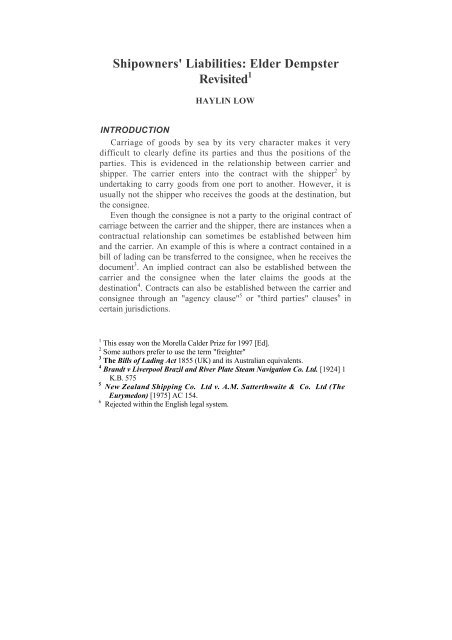
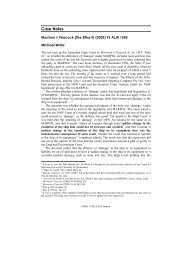
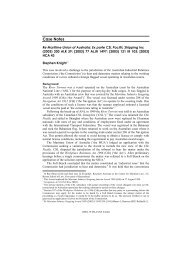
![[2002] 3 NZLR 52](https://img.yumpu.com/19004478/1/184x260/2002-3-nzlr-52.jpg?quality=85)
